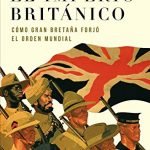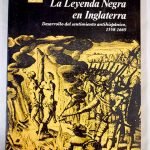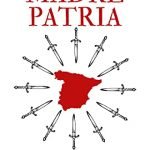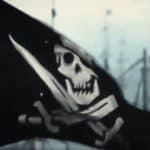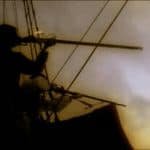
Contenidos
Los libros de texto de U.S cuentan cuentos
Las patrañas que descubrió James Loewen, cuando analizó el contenido de los principales libros de historia de las escuelas de Estados Unidos
James Loewen
Historiador y sociólogo Estadounidense, que analizó los libros de texto que se utilizaban en las escuelas de U.S encontrando graves errores.
La Leyenda Negra y sus consecuencias en las relaciones entre Estados Unidos y el Mundo Hispánico
Este profesor Estadounidense realizó un análisis de una docena de libros de texto de historia de la enseñanza secundaria. Durante 2 años estudió y comparó estos libros de texto. Y nos explica porque no encontró ninguno adecuado. Consideró que ninguno es interesante para los estudiantes. Los estudiantes han perdido el contacto con la verdadera historia de Estados Unidos. Estos libros son una combinación de optimismo sin sentido, desinformación, patriotismo ciego además de mentiras descaradas. Estos libros ocultan todos los conflictos, dramatismos y situaciones de ambigüedad que ocurrieron en la historia de U.S.
Considera que los libros cuentas historias falsas, centradas en los europeos y elaboran mitos. Muchas de las distorsiones que cuentan estos libros ni siquiera han sido elaboradas por los autores que adornan las portadas.
Lowen parte de la idea de que la historia se contar y explicar como una serie de causas y hechos, detallando también el contexto en el que ocurrieron. Trata a través de la explicación del caso Estadounidenses enseñar como se debe divulgar la historia, en las escuelas y evitar el relato único de lo ocurrido. Recomiendo que se utilicen al menos dos libros de texto, para que los alumnos puedan comparar y hacerse preguntas sobre lo que realmente ocurrió y porque lo presentan de esa manera.
Patrañas que me contó mi profe(Loewen)
James Loewen
Última actualización el 2021-05-20 / Enlaces de afiliados / Imágenes de la API para Afiliados
Lies My Teacher Told Me:
Everything Your American History Textbook Got Wrong
James Loewen
Última actualización el 2021-07-20 / Enlaces de afiliados / Imágenes de la API para Afiliados
Children of affluent white families
Even when they are forced to take classes in history, they repress what they
learn, so every year or two another study decries what our seventeen-year-olds
don’t know.
Even male children of affluent white families think that history as taught in high school is “too neat and rosy.”
African American, Native American, and Latino students view history with a special dislike. They also learn history especially poorly. Students of color do only slightly worse than white students in
mathematics. If you’ll pardon my grammar, nonwhite students do more worse in English and most worse in history.
Something intriguing is going on here: surely history is not more difficult for minorities than trigonometry or Faulkner. Students don’t even know they are alienated, only that they “don’t like social studies” or “aren’t any good at history.” In college, most students of color give history departments a wide berth.
They portray the past as a simpleminded morality play
Conversely, textbooks seldom use the past to illuminate the present. They portray the past as a simpleminded morality play. “Be a good citizen” is the message that textbooks extract from the past. “You have a proud heritage. Be all that you can be. After all, look at what the United States has accomplished.”
While there is nothing wrong with optimism, it can become something of a burden for students of color, children of working-class parents, girls who notice the dearth of female historical figures, or members of any group that has not achieved socioeconomic success. The optimistic approach prevents any understanding of failure other than blaming the victim. No wonder children of
color are alienated.
The titles themselves tell the story
The Great Republic, The American Pageant, Land of Promise, Triumph of the
American Nation.
Such titles differ from the titles of all other textbooks students read in high school or college. Chemistry books, for example, are called Chemistry or Principles of Chemistry, not Triumph of the Molecule. And you can tell history textbooks just from their covers, graced as they are with American flags, bald eagles, the Washington Monument.
Five-sixths of all Americans
As a result of all this, most high school seniors are hamstrung in their efforts to analyze controversial issues in our society.
We are not really new creatures
As a sociologist, I am reminded constantly of the power of the past. Although each of us comes into the world de novo, we are not really new creatures.
The process of hero-making
Myths
What passes for identity in America is a series of myths
about one’s heroic ancestors.
(JAMES BALDWIN)
Heroes
Heroification, a degenerative process (much like calcification) that makes people over into heroes. Through this process, our educational media turn flesh-and-blood individuals into pious, perfect creatures without conflicts, pain, credibility, or human interest.
Spain found gold
In 1499, when Columbus finally found gold on Haiti in significant amounts, Spain
became the envy of Europe.
After 1500, Portugal, France, Holland, and England joined in conquering the Americas. These nations were at least as brutal as Spain. The English, for example, unlike the Spanish, did not colonize by making use of Native labor but simply forced the Indians out of the way.
Many American Indians fled English colonies to Spanish territories (Florida, Mexico)
in search of more humane treatment.
2- The true importance of Christopher Columbus
Must not judge Columbus
Of course, this new history must not judge Columbus by standards from our
own time. In 1493 the world had not decided, for instance, that slavery was
wrong.
Opposed the slavery
However, some Spaniards of the time—Bartolomé de Las Casas, for example
—opposed the slavery, land-grabbing, and forced labor that Columbus
introduced on Haiti.
They offend
When history textbooks leave out the Arawaks, they offend Native Americans.
When they omit the possibility of African and Phoenician precursors to
Columbus, they offend African Americans.
3. Thanksgiving
Their consensus answer was “1620.”
Obviously, my students’ heads have been filled with America’s origin myth, the story of the first Thanksgiving. Textbooks are among the retailers of this primal legend.
Spanish?
Starting the story of America’s settlement with the Pilgrims leaves out not only American Indians but also the Spanish. The first non-Native settlers in “the country we now know as the United States” were African slaves left in South Carolina in 1526 by Spaniards who abandoned a settlement attempt.
Spanish Jews
Some later Spanish settlers were our first pilgrims, seeking regions ew to them to secure religious liberty: these were Spanish Jews, who settled in New Mexico in the late 1500s.
Moreover, Spanish culture left an indelible mark on the American West. The Spanish introduced horses, cattle, sheep, pigs, and the basic elements of cowboy culture, “How refreshing it would be,” wrote James Axtell, “to find a textbook that began on the West Coast before treating the traditional eastern colonies.”
Authors are WASP
Why don’t they? Perhaps because most textbook authors are WASPs (White Anglo-Saxon Protestants). The forty-six authors of the eighteen texts I surveyed ranged from Bauer and Berkin to Williams and Wood, but only two were Spanish-surnamed: Linda Ann DeLeon, an author of Challenge of Freedom, and J. Klor de Alva, an author of The Americans.
Exceptionalism
In their pious treatment of the Pilgrims, history textbooks introduce the archetype of American exceptionalism—the notion that the United States is different from—and better than—all other nations on the planet.
How is America exceptional? Well, we’re exceptionally good, for one thing.
To highlight that happy picture, textbooks underplay Jamestown and the sixteenth-century Spanish settlements in favor of Plymouth Rock as the rchetypal birthplace of the United States. Virginia, according to T. H. Breen,
“ill-served later historians in search of the mythic origins of American culture.”
The Pilgrims numbered only 35 of the 102
Bear in mind that the Pilgrims numbered only about 35 of the 102 settlers aboard the Mayflower; the rest were ordinary folk seeking their fortunes in the new Virginia colony. Historian George Willison has argued that the Pilgrim leaders, wanting to be far from Anglican control, never planned to settle in Virginia. They had debated the relative merits of Guiana, in South America,
versus the Massachusetts coast, and, according to Willison, they intended a hijacking.
Ethnocentric
But textbook authors clearly want to package the Pilgrims as a pious and moral band who laid the antecedents of our democratic traditions. Nowhere is this motive more embarrassingly obvious than in John Garraty’s American History. “So far as any record shows, this was the first time in human history that a group of people consciously created a government where none had existed
before.” Here Garraty paraphrases a Forefathers’ Day speech, delivered in Plymouth in 1802, in which John Adams celebrated “the only instance in human history of that positive, original social compact.” George Willison has dryly noted that Adams was “blinking several salient facts—above all, the circumstances that prompted the compact, which was plainly an instrument of minority rule.”
Of course, Garraty’s paraphrase also exposes his ignorance of the Republic of Iceland, the Iroquois Confederacy, and countless other polities antedating 1620. Such an account simply invites students to become ethnocentric.
Virginia
To highlight that happy picture, textbooks underplay Jamestown and the sixteenth-century Spanish settlements in favor of Plymouth Rock as the archetypal birthplace of the United States.
Dropped dead of poison
In 1623 the English indulged in the first use of chemical warfare in the colonies when negotiating a treaty with tribes near the Potomac River, headed by Chiskiack. The English offered a toast “symbolizing eternal friendship,” whereupon the chief, his family, advisors, and two hundred
followers dropped dead of poison.
The Pilgrims as our founders
As a result, and owing also to Thanksgiving, of course, students are much more likely to remember the Pilgrims as our founders. They are then embarrassed when I remind them of Virginia and the Spanish, for when prompted, students do recall having heard of both.
Their profit
“Their profit” was the primary reason most Mayflower colonists made the trip. As Robert Moore has pointed out, “Textbooks neglect to analyze the profit motive underlying much of our history.”
Profit, too, came from American Indians, by way of the fur trade, without which Plymouth would never have paid for itself. Hobomok helped Plymouth set up fur-trading posts at the mouth of the
Penobscot and Kennebec rivers in Maine; in Aptucxet, Massachusetts; and in Windsor, Connecticut.
Europeans had neither the skill nor the desire to “goboldly where none dared go before.” They went to the Indians.
Marginalizes Native Americans
The civil ritual we practice marginalizes Native Americans.
This notion that “We”
This notion that “we” advanced peoples provided for the Natives, exactly the converse of the truth, is not benign. It reemerges time and again in our history to complicate race relations.
The ideological meaning
The ideological meaning American history has ascribed to Thanksgiving compounds the embarrassment. The Thanksgiving legend makes Americans ethnocentric. After all, if our culture has God on its side, why should we consider other cultures seriously? This ethnocentrism intensified in the middle of the last century. In Race and Manifest Destiny, Reginald Horsman has shown how the idea of “God on our side” was used to legitimize the open expression of Anglo-Saxon superiority vis-à-vis Mexicans, Native Americans, peoples of the Pacific, Jews, and even Catholics.
Our textbooks omit
Most of our textbooks also omit the facts about grave robbing, Indian enslavement, and so
on, even though they were common knowledge in colonial New England. Thus our popular history of the Pilgrims has not been a process of gaining perspective but of deliberate forgetting. Instead of these important facts, textbooks supply the feel-good minutiae of Squanto’s helpfulness, his name, the fish in the cornhills, sometimes even the menu and the number of American Indians who
attended the prototypical first Thanksgiving.
Book: -Lies My Teacher Told Me: Everything Your American History Textbook Got Wrong (James Loewen)

